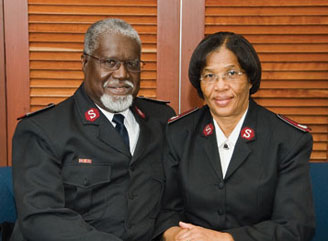
Lt-Colonels Raphael and Winsome Mason were appointed to the Canada and Bermuda Territory as territorial multicultural ministries secretary and assistant territorial multicultural ministries secretary last July. They come with over 40 years of experience as Salvation Army officers in the Caribbean, a territory made up of 15 nations and a diversity of cultures.
The colonels met as cadets in training college and were commissioned in 1968 in the Messengers of the Faith Session. Their first appointment together was as training officers. Since then, they have been appointed to corps, youth work, education and children’s ministry at Caribbean headquarters.
Salvationist.ca recently interviewed the Masons about their ministry.
What were your thoughts as you prepared to come to Canada?
RM: We weren’t sure what to expect. We were aware that there was a lot of immigration to Canada from other nations, but did not know how it was impacting The Salvation Army.
Since our arrival, we have been impressed by the extent to which multiculturalism is part of the Canadian scene and by the way it is happening naturally. It’s going to be interesting to see how “Canadian” is defined in another 10 years. The fact that we’re here in this appointment demonstrates the commitment of the Army to make the gospel relevant and attractive in a context that is Canadian. It’s challenging and exciting. We want to express our gratitude to Major Donna Millar, former secretary for intercultural ministries in the Ontario Central-East Division, for the intentionality with which she blazed the trail and set the pace to carry out the multicultural vision.
What is your perspective on multiculturalism?
WM: The national motto of Jamaica is “Out of many, one people.” In Jamaica we have learned to live with people from many different backgrounds and to see them as “Jamaicans.”
The Lord says we are to love without discrimination. We need to be challenged to show that love. We need to make choices every day to be forgiving, loving and accepting of people. The Bible teaches us how to treat foreigners and how to follow God. It’s a way of forgiveness, peace and love, all of which Jesus showed us.
RM: We need to recognize that the end is not multiculturalism. The end is Christ. He should be our main focus and motivation at all times. In the multicultural ministries portfolio, we have taken Isaiah 56:6-8 as our foundation: “ ‘And foreigners who bind themselves to the Lord to minister to him, to love the name of the Lord, and to be his servants … these I will bring to my holy mountain and give them joy in my house of prayer … for my house will be called a house of prayer for all nations.’ ... ‘I will gather still others to them besides those already gathered.’ ”
As part of the Church, our job is to carry out the Great Commission. How do we do that within the context of multiculturalism?
WM: The nations have come to those who once went to them. It’s so hard to get people to “go” with all of the violent situations around the world today. But God, in his love, is bringing people from other nations here. The Salvation Army is capitalizing on that.
Canadian society has undergone enormous changes in the last 30 years in terms of the people who now call it “home.” As the Army adapts to them, what would you say to people who are afraid of change?
RM: Don’t allow fear to precipitate flight, but allow faith to bring fulfilment. Kingdom culture is all-inclusive in terms of eligibility. It doesn’t reject where you’re coming from. It puts everyone on an equal footing. Multiculturalism is not just for corps. It is for all of The Salvation Army in Canada and Bermuda. It is a vision, not a corps program.
WM: There’s fear involved in change. But instead of leaving a place that is changing and finding a new place that is more comfortable, remember to look at God’s Kingdom as a body. Every part is necessary. Every person is of value. It might be helpful to think, “Maybe the people coming in will have something for me.”
How have you seen multiculturalism work within the Army in Canada and Bermuda?
RM: There is no such thing as the correct model, as long as the model you’re using manifests the vision of multiculturalism. Each ministry unit needs to reflect its community. That is the vision.
WM: One corps that was in decline is seeing new growth by integrating an immigrant group, which happens to be Spanish-speaking, into its fellowship. It’s encouraging to see that the leadership and congregation have bought into the multicultural vision by integrating Spanish into worship services. They are even learning to speak Spanish!
RM: We have seen ministries at different stages of their multicultural journey and observed some challenges. Salvationists who have been comfortably settled in Canada for many generations are being challenged to make adjustments. They have to distinguish between things that are “of culture” and things that are “of Christ.” Jesus had to make a cultural shift when he left the glories of Heaven for our sakes. That gives us an example to follow.
What would you encourage Salvationists to do in order to become part of the multicultural vision?
WM: We need to pray and educate ourselves about the people who are coming to us. Accept people as individuals, just as we want people to accept us. This is Christian living.
RM: Begin to become aware of who is in your community and educate yourselves about them so that when the invitations go out, you can begin to accommodate them.
WM: As Christians, we have to make a choice to live out what we know is true. We should be able to do it, by the grace of God, and do it better than the rest of the world.